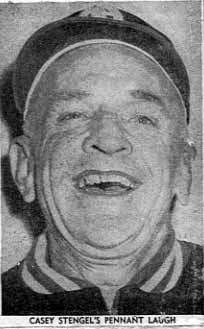

Relax all ye true believers, for the strain is over....virtue has triumphed....the pennant is ours.
Our nine honorable, ancient but durable heroes outlasted Sacramento yesterday to win the first game, 10 to 8.
This feat, expected and demanded by the right thinking element, left Fearless Francis O'Doul, our West Bay neighbor, lamenting the immutable law of percentages, which slammed the door on his index finger.
It would be an understatement to say that in this, the occasion of Oakland's first Pacific Coast League championship in 21 years, the joy was unconfined.
To be frank, in many quarters it was both pure and unrefined.
The crowd began to fill the stands at 11 a.m.-- two and a half hours before game time. When Manager Casey Stengel herded his charges from the dressing room only standing room was available.
12,000 FANS ON HAND
The influx discommoded several people who, it was said, had slept in the right field boxes all night in order to be part of the 12,000 who were on hand for the day of days.
The sun was warm, the beverages cold and lines before all the concessions -- even the ladies were forced to wait in order to powder their noses.
It was not exactly what could be called a tight ball game, but nevertheless a treasure for those who make Emeryville their habitat and therefore are accustomed to such things. All hits were important though -- especially if they went over the fence, and many did.
Stengel's men were afforded stern opposition. In truth, the visitors indicated they had moved into the Emeryville park when Outfielder Joe Marty applied maximum leverage in the fifth inning to bring in three runs which made the score Oakland 6, Sacramento 7.
WRONG-SIDE HOMER
This home run, which was not in accordance with the Horatio Alger script the indomitable, clean living and home loving Oaks have been following, brought several hundred spectators to their feet in glee -- which shows there is no accounting for taste or lack of common sense.
It also resulted in Ralph Buxton relieving pitcher Floyd Speer, who had relieved Earl Jones -- as Stengel strove to get the most out of those who were said to have the least.
Buxton, known in the parlance of the profession as a "fireman" or extinguisher of hot enemies, proved to be just that.
But, before the last wisp of smoke had been smothered, Miss Ruth Smith, RN, who heads the first park aid room, had spent considerable time reviving customers who had succumbed temporarily because of over-exposure to sun, excitement and beer.
SACROILIAC GIVES WAY
Her most interesting case was a Berkeley resident -- Cragmont area -- who dislocated his sacroiliac while urging the Oaks to greater effort.
He spent most of the game on the first aid bed. His wife called for him afterward, and with the aid of her score card recapitulated how Oakland tied the score in the next inning and then went into a permanent lead.
Buxton received credit for the victory, but was not on hand for the final out. That honor went to James Tobin, another elderly Oakland employee, whose specialty is known as the flutterball.
Accurate stopwatches have proved that this pitch requires approximately eight seconds to traverse the 60 feet and six inches to the plate.
Ths Solons, an impatient lot at best, found this intentional delay both unseemly and irritating. As a result they hit the ball either on the top of its head or on the neck never on the chin.
Their savage but futile swings delighted the crowd sufficiently to demonstrate that if football spectators were as noisy and spontaneous, colleges wouldnt need cheer leaders which would discourage some potential lawyers from obtaining higher education.
The final out came when Alex Kampouris bounced the ball gently to Tobin. Big Jim, ignoring the first baseman, chose to race Kampouris to the bag, and won.
By tradition, Tobin thereby gained ownership of the ball. He will be able to buy an elaborate trophy case for it, as the victory meant some $1,000, individually, to the Oakland regulars.
Enthusiasm reached a new high with the final play. One man left his bleacher seat and kissed an entire stranger sitting in a reserved box with a Marine sergeant he had had his eye on her since she entered with two out in the first.
The Marine said he understood. Although he had recently moved to Oakland, he had once played shortstop for Quantico. The situation was much the same throughout the park. Some men even were seen kissing their own wives.
It was Stengel's third pennant in 23 years as a manager. The first was with Toledo in 1927, the second was with Milwaukee in 1944. During that span of years, oil also was discovered on his Texas property. Stengel released the following statement concerning his attitude toward things in general:
"Old Case is pretty well satisfied," he said.
For Oakland, it was the third trip to the top. The other winning clubs were in 1912 and 1927.
Very few spectators stayed for all of the concluding game, which Oakland won, 6 to 5, and as the crowd decreased within, the air of festivity increased without.
An eating establishment near the grandstand raised a large, bunting-draped sign, which read:
"Casey Stengel
is our man.
To the Seals,
He tied a can." . . . Tenn.
Next year, the management indicated, a solid gold plaque will be installed. It will state simply:
"Casey Stengel ate here."